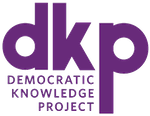Who We Are and What We Offer
The Democratic Knowledge Project (DKP) is a K-16 civic education provider based at Harvard University. We offer curriculum development resources, professional development workshops for educators, and assessment tools and services—all in support of education for democracy.
The DKP has now co-designed an open source year-long Grade 8 Civics Course with the Cambridge Public School District: “Civic Engagement in Our Democracy.” Known as the DKP-Cambridge Grade 8 curriculum, it is open source and available to all Massachusetts educators. In addition, we offer the following resources and services:
Curriculum:
- The DKP-Cambridge Grade 8 Civics Curriculum: “Civic Engagement in Our Democracy”
- A Declaration of Independence videogame (produced by Amplify)
- The Ten Questions for Change-makers Reflection and Action Framework for Action Civics
- A Set of Action Civics Case Study Exemplars
Professional Development:
- Workshops at Harvard University
- Massachusetts Library System Professional Development Opportunities for Youth Librarians
- In-district trainings
- In-school trainings
- Curricular co-design services
- Coaching support
Assessment Services:
- Assessment tools to accompany the DKP-Cambridge Grade 8 Curriculum
- Consulting services for school, district, and state level assessment and accountability frameworks
Our History
The DKP originated in 2008 as a basic research lab at the Institute for Advanced Study in Princeton, New Jersey. Principal Investigator and then Institute faculty member Danielle Allen focused her lab on three key areas—(1) the Declaration of Independence, the American founding, and American political thought and institutions; (2) the impact of new media and digital technologies on youth civic development; and (3) assessment in the humanities and liberal arts. Since the majority of instructors and practitioners in these domains understand their pedagogy to have a civic purpose, this assessment work quickly evolved in the direction of assessment for civic education. In 2015, Allen moved to Harvard and brought her lab with her.
Over time, the DKP began to develop resources for teachers. In order to know if what we were building had any value, we also built networks of teacher-leaders to tell us what was useful and to help guide our resource development. This led us to build a co-design practice for curricular development where we partner with educators. Our teacher networks also grew into educator professional development communities, and we grew into a professional development and coaching provider.
In February 2018, the DKP decided to make a full pivot to add a formal implementation arm to our basic research practice. The faculty advisory committee of the Edmond J. Safra Center for Ethics endorsed this development as a formal initiative of the Ethics Center. We launched as a civic ed provider in parallel to the development and passage of the Commonwealth of Massachusetts’ 2018 History and Social Studies Framework.
How to Work with Us
If you’d like to explore a partnership with the Democratic Knowledge Project, please click 'Contact Us' below to contact our Pedagogy Manager, Michael Blauw. As a first step, we set up a needs assessment conversation so that we can learn more about the needs of your district, school, and classroom, and so that you can learn more about what we can offer. We then follow this conversation up with a proposal development process in order to establish a formal partnership. Once appropriate decision-makers in your district or school have signed off on the proposal, we can get to work.
